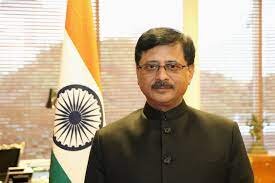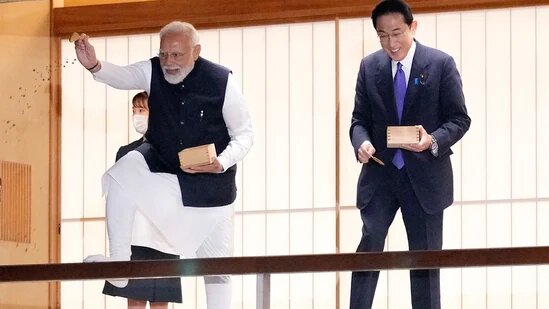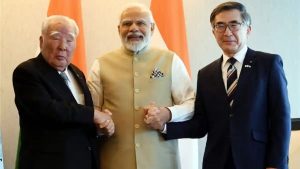
With every passing day, India-Japan relations are scaling new frontiers. The bilateral talks between Prime Minister Narendra Modi and his Japanese counterpart Fumio Kishida on the side-lines of the Quad summit in Tokyo on May 24 provided a fresh momentum to the blossoming India-Japan relations. In this interview with Manish Chand in Tokyo, India’s Ambassador to Japan Sanjay Kumar Verma highlights developing personal chemistry between the leaders of India and Japan and visible progress in crucial areas such as trade and investment, supply chains and defence. The geostrategic and geo-economic aspects of the relationship are getting intertwined. Alluding to new developments, the Indian envoy hints that the prospects of India and Japan jointly producing a high-end defence equipment are high and expresses hope that the 35 billion Yen (42 billion USD) package of investment announced by PM Kishida during his visit to India in March will be surpassed.
(Excerpts from the interview)
Q) Prime Minister Modi held wide-ranging talks with Japanese Prime Minister Fumio Kishida in Tokyo after the conclusion of the Quad summit. What was the major takeaway from these talks? How do you see personal chemistry developing between the two leaders?
A) The two prime ministers spent quite a bit of time discussing how to further engage in finding new domains for expanding India-Japan cooperation. On the global stage, the chemistry between the leaders is extremely important – we saw that chemistry developing between the two leaders in March earlier this year and now at this meeting in Tokyo. Personal chemistry with leaders of the past had been good and personal chemistry amongst the leaders of today are the best.
Q) One of the key outcomes was to take forward defence cooperation through joint defence manufacturing. How do you see this initiative progressing despite the nature of Japan’s pacifist constitution?
A) India-Japan cooperation in the defence domain has been developing over the years. Agreements concerning transfer of defence equipment and technology and cooperation on security measures for protection of classified military information were signed in 2015. The signing of Reciprocal Provision of Supplies and Services Agreement between the two sides in September 2020 was a landmark step. We would certainly like to see much more happening in the area of defence equipment and technology cooperation. But it is a field which is sensitive. It is an area where a lot of issues have to be discussed before you take the next step. The discussions are happening in good faith and trust. We see a gradual trust building process taking place.
We have not yet reached the situation where India and Japan can jointly produce a defence product. But I hope that due to such interactions between the prime ministers, probably this will be possible at an early future date. Technology and equipment cooperation will be a major focus area in defence cooperation.

Q) Prime Minister Modi met over 30 business Japanese leaders in Tokyo. Do you see a very visible change in the sentiment of the Japanese business community towards investing in India?

A) Japan is the fifth largest investor in India. Bilateral trade is growing every year. We are looking at around 14% increase in Indian exports to Japan. On trade and investment side, cooperation has been steadily expanding. In March, when Prime Minister Kishida visited India, there was an intention by the two prime ministers to have 5 trillion Japanese yen investment coming into India through private, public and financial modes. If you look at the earlier similar figure in 2014, it was fixed at 3.5 trillion yen which we surpassed. I have no doubt that even 5 trillion Yen will be surpassed over next five years’ time period given to it. There is visible enthusiasm in Japanese industry for investing in India. It is both a result of the attractiveness of India, and the result of disruptions, which these companies experienced during the COVID-19 pandemic period.
Q) In the wake of the pandemic, India, Japan and Australia forged Supply Chain Resilience Initiative. How is this initiative progressing?
A) Supply chain was a major underlying factor in many of the discussions, including in the business round table chaired by PM. When supply chain is seen holistically, it does not involve only commercial products, but also energy, food, other supply chain-related integrations. Japan has a policy of supply chain diversification. India is very much a key partner there. Many of the Japanese companies have gone more towards India for their fresh investments or their reinvestments; they’re also relocating themselves or diversifying these companies themselves into other countries in the Southeast Asia region. This particular initiative is going well. With each day, we find new interest among the Japanese companies to go to India and try to have the full supply chain possibility or integration of supply chain.
Q) Another important development in India-Japan relations is the deepening of the strategic connect. In what ways can India and Japan deepen collaboration in the Indo-Pacific?
A) Whenever we talk about the Indo-Pacific, we talk about a shared vision, which has some key components. The first thing is the peace and stability in the region, which is of paramount importance, both from an economic perspective as well as geostrategic and geopolitical perspectives. Secondly, rule of law. Prime Minister Modi has spoken about it in various meetings and platforms about rule of law. Rule of law, with peace and prosperity, is equally important. Without following the rule of law, stability cannot be achieved. With the rule of law comes the United Nations Convention on the Law of the Sea (UNCLOS). We need to make sure through international integration that the sea lanes are free to everyone for peaceful purposes such as trade.
Q) Was there any specific discussion on Chinese activities in the region? How can India and Japan can collaborate to counter such activities?
A) Common threats were discussed but with that, common opportunities were also discussed. These threats will have to be known to all like-minded countries in advance. At the same time, opportunities for further international collaboration emanating from these kinds of threats are also important and they, too, were discussed.
Q) What will be the major focus areas for India-Japan relations in the future?
A) Geostrategic and geopolitical would be a key factor not only as domains themselves but also facilitated domains for other domains to take forward. Economic cooperation, for example, is a cornerstone of India-Japan bilateral relationship. That would only prosper if you have peace and stability in the region. Geostrategic and geopolitical will become the main pillars of the relationship, which in turn will drive other areas of cooperation such as critical technologies, research and development, trade and investment and supply chain resilience.
Q) Do you think this is going to be essential partnership of the 21st century, especially for both countries?
A) Yes, not only for both countries, but also for the entire as India and Japan are two giants in the region.
If these two countries have excellent intensive relationship, we can assure other geographies in the world that the world will be better and a peaceful place to live in. Looking ahead, enhancing people-to-people contacts will be crucial in driving the relationship forward. The government should send its ambassadors, but any Indian who comes to Japan is a people’s ambassador. Any Japanese who goes to India is a people’s ambassador. Therefore, it becomes extremely important for both countries to focus on P2P relationship, which will also galvanise other aspects of the relationship.

(Manish Chand is CEO-Editor-in-Chief, India Writes Network, India and The World magazine and Director, Centre for Global Insights India, a think tank focused on global affairs)
Author Profile

- Manish Chand is Founder and Editor-in-Chief of India Writes Network (www.indiawrites.org) and India and World, a pioneering magazine focused on international affairs. He is CEO, Centre for Global India Insights, an India-based think tank focused on global affairs.
Latest entries
 India and the WorldFebruary 17, 2026South-by-South: Focus on people-centric solutions at India AI summit
India and the WorldFebruary 17, 2026South-by-South: Focus on people-centric solutions at India AI summit India and the WorldFebruary 7, 2026Modi hails interim India-US trade deal, Goyal says no concessions made on agriculture
India and the WorldFebruary 7, 2026Modi hails interim India-US trade deal, Goyal says no concessions made on agriculture India and the WorldFebruary 2, 2026Trump announces trade deal with India, Modi ‘delighted’
India and the WorldFebruary 2, 2026Trump announces trade deal with India, Modi ‘delighted’ India and the WorldJanuary 31, 2026Palestinian minister bats for mediatory role for India in ending Gaza conflict
India and the WorldJanuary 31, 2026Palestinian minister bats for mediatory role for India in ending Gaza conflict







